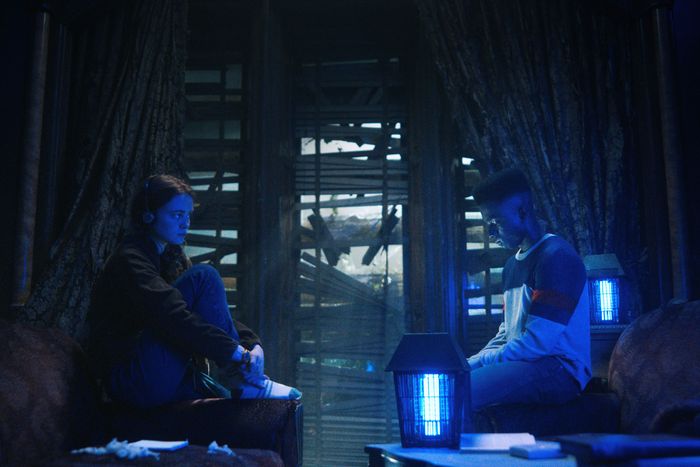
Yes, this article is rife with Stranger Things spoilers. Consider yourself warned.
One of the most affective moments in the first part of Stranger Things 4 was the deployment of Kate Bush’s “Running Up That Hill (A Deal With God)” as the song that ultimately saves Max’s life. Not only was the track used powerfully in the scene where Max escapes the ropey hands of Vecna, it turned the song into a top-ten hit for the first time nearly 40 years after its original release. Making Kate Bush popular may be the greatest public service this mammoth Netflix saga has ever performed.
It’s no surprise, then, that the song reappears in Vol. 2, which adds two final, supersize — or, if you prefer, unnecessarily long — episodes to the sprawling fourth season. Max, easily the biggest Kate Bush fan in Hawkins, Indiana, listens to it through her Walkman headphones during a key interaction with Lucas. We hear instrumental versions of the new-wave classic that are clearly meant to convey the emotional stakes as the characters try to take out Vecna for good. On one hand, it’s great to hear this moody piece of music getting so much attention. On the other, its repeated use is emblematic of what became so frustrating about Stranger Things during its fourth season: its redundancy.
This penultimate season of Stranger Things — season five will be the last — sets itself up to build toward certain moments: the rescue of Eleven from Dr. Brenner’s lab, Hopper’s escape from Russia, and an attempt to snuff out Vecna/One and save the town of Hawkins. Because the episodes’ runtimes have basically been injected with steroids, a lot of time has to be filled until those ultimate objectives can be achieved or not achieved. The sense that water is being treaded, then retreaded, becomes particularly acute in the last two episodes, which last for 85 and 150 minutes, respectively.
Watching these episodes is like looking at a huge, finished Lego set and recognizing how each plastic brick got snapped into another plastic brick. The bloated finale, in particular, constantly toggles between plot-related action and heartfelt conversations in which two characters discuss their feelings for each other. See: the talk between Steve and Nancy about their potential future, the talk between Hopper and Joyce about their romance, the talk between Jonathan and Will about their relationship as brothers, or the talk between Jonathan and Nancy about whether they’re still a couple. When everyone’s not gabbing about their relationships, they’re finding themselves in situations that definitely look familiar. Once again, several characters get ensnared in the snarling vines of the Upside Down. Once again, Eleven has to go into a makeshift sensory-deprivation tank to summon her powers. Once again, an ’80s song is performed to advance the effort to combat evil. (This season, it’s “Master of Puppets” by Metallica instead of “The Never-Ending Story” by Limahl, but in a lot of ways, season four is its own never-ending story.) Too many times, you watch and go, “Seen this before. Yep, seen that too.”
Even the dialogue nods to this redundancy. “I swear we’ve seen this tree before,” says Robin while she, Steve, and Nancy roam the woods in the Upside Down. That’s because you, as well as those of us watching, probably have seen that tree before, Robin!
“We broke out. We can break back in,” says Hopper, explaining why it’s necessary to return to the gritty Russian prison from which he literally just spent multiple episodes escaping. By the end of the season, after a 12-hour investment, we land back where we started: with Vecna still alive and Will Byers feeling weird tingles on the back of his neck. “Running Up That Hill” suddenly seems like an even more apropos theme for a season that increasingly felt like trying to reach a summit and never getting close.
I can recognize the irony in accusing Stranger Things of repeating itself, since the premise of the show is rooted in copying the pop culture of the 1980s, when the show takes place. Before we ever watched Stranger Things, we had already seen Stranger Things, in a sense, by absorbing the mainstream entertainment from that decade — from Stephen King novels to films like Poltergeist, Nightmare on Elm Street, E.T., and Stand by Me. What made Stranger Things fun in its first two seasons was that it took elements from those known quantities and remixed them to create something that felt new but was sprinkled with callbacks to the past.
By the end of season four, though, the show is replaying its own greatest hits way too often. If I could make a deal with God, or at least with the Duffer Brothers, I would ask that Stranger Things take a more streamlined approach in its final stretch. Make some episodes that last only 40 minutes. Tell stories that have genuine arcs instead of units that slide together like the particle-board pieces in an Ikea dresser. And when a song like “Running Up That Hill” is deployed so effectively in a pivotal sequence, bring it back sparingly so that the power of that initial usage doesn’t get diluted. To borrow from the words of the wise Robin Buckley: Show us some trees we’ve never seen before. Get us to the top of the proverbial hill instead of leaving us running in circles.


